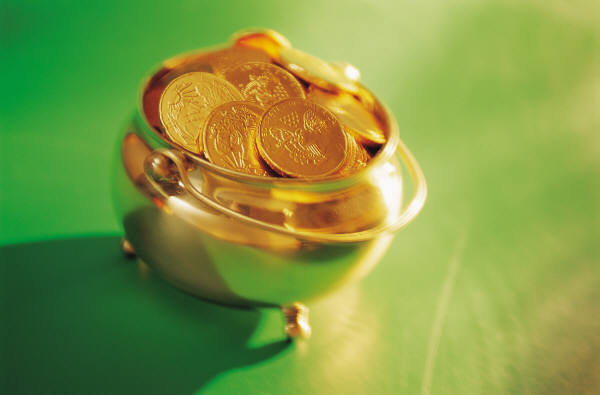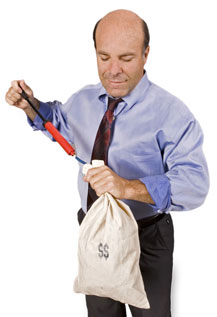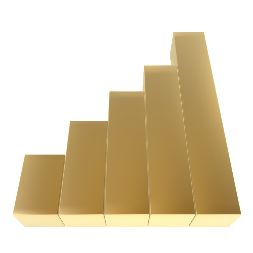How to Sell Gold For Cash
In this section you can learn how to sell gold for cash profitably.
Selling your gold jewelry for cash is often an intimidating process because the Cash for Gold business is notorious for scams and cheats.
While we’d love to live in a world where kindly people helped us navigate through these situations, it seems like the older we get, the more we realize the sad truth that many unscrupulous people actually use our lack of knowledge against us.
Quick-talking salesmen peddling snake oil. Quack lawyers. Quack doctors. Quack repairmen.
"Business people" taking advantage of their expertise, drowning you with jargon then making you pay through the nose for help when you’re vulnerable.
You get the sinking feeling you’re getting cheated, but aren’t exactly sure what to do about it.
You don't know the inner workings of that broken-down V-8 transmission yourself!
You HAVE to find someone you trust! But who is THAT?!
Selling your gold and silver jewelry for cash is often an intimidating process like this, for very good reason. The water around you is indeed infested with SHARKS!
The Cash for Gold business is notorious for scams and cheats.
The very sad truth is, many businesses in the Cash for Gold industry have amassed a fortune for themselves using a business model that counts on the fact that few people coming to them looking to turn a few bucks know anything about what they're doing! That's right.
They count on YOUR naiveté about selling jewelry in order to rake in a tidy profit for themselves.
We hope our free educational materials give you the honest and forthright guidance and advice you deserve.
In this guide, you’ll learn:
• The essential rules when selling jewelry for scrap
• Determining the value of your jewelry yourself
• How to spot a rip-off a mile away!
• The things you should always do if you want the best prices
• And the things you should avoid at all costs (but most people don't)
Investing a few minutes reviewing this material now will save you time, ensure that you get the absolute BEST deal, making you MORE money, and prevent unnecessary stress, worry and aggravation!
The First Rule: Know How Much It’s Worth – Until You Know “Value”, You Know Nothing

If you know for a fact that your necklace is worth somewhere in the neighborhood of $350-375 as scrap gold, then the shark who smiles out you and insists top dollar for it is $175, doesn't stand a chance of fooling you.
So job #1 is estimating the current value of your gold.
Before we really get rolling it’s smart to start the process close to home.
When you know about the gold in your own house, you’ll have a leg up on any negotiations with anybody about any jewelry.
We're going to teach you to do a rough appraisal of your own jewelry.
Before you ever show your jewelry to anyone else for an appraisal, it pays (literally) to know a good estimate of its value yourself.
Obviously, appraising jewelry is a skill that gets honed over a lifetime.
We're not saying you’ll learn enough to become a professional-level expert using this guide alone. That's not our intent.
What's important is that you become knowledgeable enough to never get bamboozled.
So, go open your jewelry box and pick out a few test pieces that you believe have value.
First go get a magnet off your refrigerator. Grab a magnifying glass and digital scale if you have them.
If not, we'll explain which scales are best and where to get them a little later.
When it comes to selling jewelry for scrap, there are three main factors in determining what any piece of jewelry is worth:
• Purity
• Weight
• The current “Spot Price” of Gold
Things like how pretty it is, or how old, or whether it was worn by Queen Elizabeth are not important when selling your jewelry to a scrap metal dealer.
All Cash for Gold dealers sell what they buy to to a refinery, where it will get melted down and turned into bullion.
If the jewelry you are considering selling is precious for other than sentimental reasons, scraping it is probably NOT what you want to do.
You might be better off auctioning it or selling it to someone who wants it as jewelry.
Before we go any further . . . remember that magnet you pulled off the refrigerator?
That’s the first step in determining if your item has any value at all. Run the magnet over anything you are considering to sell.
If the magnet picks it up . . . forget it. It’s junk. It’s iron.
Don’t embarrass yourself by taking it to a metals buyer that will only toss it back at you.
Making a rookie mistake like that instantly tells the buyer he’s dealing with a chump.
An easy mark. You already lost your sellers edge by proving you don’t know your own stuff. So, 1st step… it with a magnet!
Purity
How much pure gold a piece of jewelry consists of is of utmost importance in figuring resale scrap value.
The term Karat (abbreviated K or Kt) is an indication of purity.
24 karat gold is as pure as it gets.
Karat measurements less than 24 have other metals mixed in with the gold.
See, pure 24K gold is too soft to be used in jewelry. Plus, it's expensive.
To make jewelry more durable and affordable, the 24 k stuff is diluted with stuff like platinum, nickel, and copper.
These added metals are called alloys.
When you sell for scrap, the gold content is all that is considered . . . and what brings in the bucks.
The lower the karat count, the more metal alloys have been mixed in.
The chart below shows the percentage of pure gold you have for each karat content:
24 K = 99% pure
22 K = 87% pure
18 K = 75% pure
14 K = 60% pure
12 K = 50% pure
10 K = 40% pure
Once you know the karat content of any piece of gold jewelry, you know the purity level.
You can then use that information along with weight and the current spot price of gold to determine VALUE.
FINDING THE KARAT STAMP

If you’re looking for the karat rating on your jewelry, you shouldn’t have to look very far.
Gold jewelry manufactured and sold in the United States is required by law to have its karat measurement stamped on it.
Flip your piece open and look at the reverse side (if your jewelry came in a box, it might be there) – you can use a magnifying glass.
It’s easiest to do this with an inexpensive jeweler’s tool called a loupe.
Look for etchings that tell you about the purity and weight of the piece. If it simply says “14K”, you’ll know what you’re dealing with.
If you get a number, you’re dealing with a parts per thousand rating.
750 would translate to 18 karats, 417 would be a 10 karat piece, and 583 would be 14 karats. Obviously, pure 24k gold is best.
Problem is, you're not likely to find that in your jewelry box.
On smaller pieces, you’ll probably just get a carat rating, but sometimes you’ll find an indication of weight, too.
Weight
The next factor for determining the value of your jewelry is knowing how much it weighs.
The absolute best way to measure the weight of your gold is to buy a digital scale, especially for gold jewelry with a DWT feature.
(DWT is an abbreviation for the term Pennyweight)
If you’re just starting out, you can pick up a decent pocket size DWT scale for under 20 bucks.
If you use a scale not meant for gold, you'll have a bit of calculating to do but you can still easily get a decent estimate.
Here in the United States, weight is measured in pounds and ounces, and occasionally grams.
Any scale you buy for measuring food or postage will weigh in traditional ounces, pounds, (16 oz. in 1 lb.).
The metric scale with weight measured in grams and milligrams is also familiar to Europeans and most Americans.
However, since gold has been a currency on the International Market since the dawn of time, different measurements are used.
Knowing the differences will eliminate tons of confusion! Forget about standard ounces or even gram measurements for light-weight items.
Pennyweights and Troy Ounces are the universally accepted standard terms for measuring the weight of gold.
There are twenty pennyweights to one Troy Ounce.
DWT is the symbol for pennyweight and TOZ is the symbol for Troy Ounce. Both terms date back to ancient times.
Anytime you are dealing in the scrap gold market, pennyweight and Troy ounces are common terms you MUST be familiar with because money trades hands based on those measurements and those measurements alone.
Converting back and forth leads to confusion.
It's one tactic an unscrupulous dealer would use to purposely confuse you!
WEIGHTS COMPARED

In case you can't get your hands on a digital scale meant for weighing gold in pennyweights, I want to give some comparisons so you can have an easier time with conversions and estimated appraisals.
One troy ounce is 31 grams. The standard American ounce is 28 grams.
So a troy ounce is about 9-10% heavier than a standard American ounce.
IT'S VERY CONFUSING TO TRY AND CONVERT BACK AND FORTH, BACK AND FORTH. So don't do it if you can avoid it.
Round off for easier estimating.
Any reputable gold dealer is going to work with pennyweights and Troy Ounces but if they throw those terms around and if you have no clue what they mean your head is likely to be swimming.
Just keep in mind, there are 20 DWT’s or Pennyweights in one Troy Oz.
Most dealers will state their buying price in X number of dollars “per pennyweight” of whatever karat gold you have. Now the math is easy!
Multiply your number of pennyweights by the price per pennyweight and you have your VALUE… that isvalue from the dealers perspective… your idea of value may differ once you know the “Spot Price”
SO…
The only other factor to consider is the Spot Price.
But in reality… the difference between the “Spot Price” of gold and what your dealer is offering you, less refining fees is his profit.
And he deserves to make a profit… but it’s your job to make sure it’s a “reasonable profit” and you are not getting screwed.
Spot Price
The current price of gold on the open market changes multiple times per day and is called the Spot Price.
The term "London Fix" is also heard. That specific term refers to the 5-member Internal Board in London that determines the ever-fluctuating Spot Price.
You can check the spot price at kitco.com, a well-respected international precious metals company.
The Spot Price will be price per Troy Oz of pure gold. 98% of Spot Price is the price paid to dealers who deliver gold to a refinery for melting.
That's not you, that is the Cash for Gold vendor. He gets close to the Spot Price because he brings large quantities to be refined.
You get a percentage of that. The rest is his profit margin.
In order for you to get the best deal possible, you need to find a vendor who pays a respectable fee relative to the spot price.
Now, it's very important for you to know that vendors who buy from the public then sell on the open market can pay their customers whatever the customer is willing to accept.
There's no law that says they have to give you anywhere near spot price! In the best cases, you can get 70-80% of the spot price.
In the worst cases, you only get paid about 5% of spot price!
The difference between the spot price and what they pay you is their profit margin.
As previously stated, the Cash for Gold dealer deserve to make a profit but they DON'T deserve to intentionally gouge you.
And they can’t if you know the true value of your jewelry!
But that is, unfortunately EXACTLY what usually happens
The Cash For Gold Scam Revealed!

Imagine this. You walk into your local Cash for Gold dealer, clutching a bag with a few valuables you hope will help you pay off the car.
The guy behind the counter flashes an awesome smile and projects power and confidence.
And he’s just so personable that you can't help but like him. He weighs that necklace you hand him and you can see quite plainly that it weighs four…somethings.
Then he unleashes a stream of jargon, figures and calculations that make your head spin.
"Four Pennyweights, which is four hundred percent of the one-twentieth of the ancient Troy ounce measurement.
We'll multiply that by the 25% softness and durability factor purity rating of this 10 karat necklace and that means your necklace might have been purchased for $75 but due to the transitory nature of the spot price London Fix devaluation of karat, my top price at this time is $35." WHAT?
Compare that common scenario to walking in there KNOWING the necklace weighed about 5 grams.
So figure 10% or so less than that as pennyweights. It's actually an 14 karat necklace so is 60% pure.
That at the current Spot Price of a pennyweight is $87, so the 100% of the scrap value is $348 and any reputable Cash for Gold Dealer should offer at least $250.
See how being an informed consumer can save you big bucks? In fact, being informed EARNED you big bucks.
That’s important because you can’t “save” your way to riches . . . but you can “earn” your way to a comfortable lifestyle . . . and we can show you how.
Bottom line is, these “cash for gold” dealers win big time when you know little or nothing about the value of your gold.
Not knowing puts you at a distinct disadvantage.
They’re trained to look you in the eye and convince you that your gold is worth much less than it really is.
That won’t happen, it CAN'T happen, once you are armed with the information you've just received in this book.
Don't just take our word for it. Here is a video online of an investigation done by the Today Show that shows just how common Cash for Gold scams really are.
It’s shocking, but you ABSOLUTELY need to see this.
Anyway, here are the cliffs notes:
The 3 factors that go into determining the value of your jewelry are:
· How pure it is (Karat)
· How much it weighs (DWT and TOZ)
· How much the vendor is willing to give you relative to the spot price.
The Second Rule: Know Where To Sell

If you hadn't been smart enough to prepare yourself with the vital information you've just read in this guide, it would be next to impossible to find a reputable dealer.
You can't just judge by how nice they seem! Or how fancy their offices are.
Heck, if they have fancy offices maybe that's because their profit margin is too high!
You also can't judge just by fancy graphics and fancy-looking websites.
So how do you tell? This section details the many choices you have when selling your jewelry and gives the pros and cons of each option.
We’re All Hurting!
The economy is terrible, and it seems like it piles on the hardest against the people at the bottom.
Now, contrary to what you hear on the news, that isn’t the lifestyle of the typical American.
Most of us are still lucky enough to feel fairly prosperous. BUT... more and more people are finding out that all it takes is one bad break, an injury, or just the whims of some higher-up in a suit… to find themselves staring down debt, poverty, foreclosure or worse.
And trust me – circumstance doesn’t blink for anybody.
People who felt economically secure 10 years ago have a different outlook today.
Unemployment and job loss are at record levels. Selling off some assets to bring in some needed cash is an option more and more people consider.
Gold and silver jewelry pieces are one of the best things to sell for several reasons:
• It has true monetary value.
• You might not even wear it anymore.
• It's easily accessible and provides a quick turn-around.
• You don't have to qualify like you would for a loan.
So, once you establish in your own mind that the payoffs are worth it, make sure you get the best deal possible.
One thing is certain, the worse the economy gets, the higher the value of gold rises – jewelry you bought on a whim a few years ago has probably skyrocketed in value without you knowing it.
It's highly likely that it is worth more today than the day you bought it brand new!
Now, here’s the thing - you can only sell each piece of gold once… and as we've discussed, there’s a stampede of shady sellers out there who are out to pump you with bad information and take you on a ride.
You don’t have a margin for error – jewelry is important to most people, and you can’t lose it as part of some “learning experience”… you have to get it right the right time. That's why you downloaded this guide!
You really CAN get it right. Now that you have a basic understanding of how to estimate the value of your jewelry, we’re going to take you on a little “virtual tour” of the gold buyers world and explain who's who.
Let's start with the group most commonly considered the most reputable source you can find for determining the value of your gold.
The Appraiser
The professional appraiser (usually a certified gemologist or jeweler) is the most trustworthy source to determine value.
The information you've just learned from this guide gives you the vocabulary and knowledge to speak with a professional appraiser with confidence.
Of course, hiring a pro could cost you a few dollars but if you have a hefty amount to sell it can be well worth it.
Now, keep in mind there's a difference between selling it for scrap and selling it as jewelry.
They might tell you that a piece is worth more because it has a unique history, limited production or is particularly gorgeous.
If so, ask lots of questions and dig into this with the appraiser as much as possible because honestly, sometimes it's better to keep a piece as jewelry.
You might fetch a higher price at a quality auction or some other type of retail sale that keeps the piece intact.
Scrap gold buyers give zero consideration to anything outside of melt value.
Appraisers value your gold based on what you’d expect to pay for a similar piece at retail.
Even fashion trends influence that value so it's very subjective. “Melt Value” on the other hand is objective.
Another tip for you, the consumer, is to realize that your run-of-the-mill jewelry appraiser is less observant of the rapidly changing spot price than a Cash for Gold dealer.
Appraisers don’t usually flip gold as quickly as a Cash for Gold dealer.
It’s likely that they’ve got a more set price for gold in mind and don’t change it twice a day, which is always a consideration in quick turnaround Cash for Gold situations.
Professional appraisal services are great for figuring out a price point for insuring your jewelry, but if you're interested in the value of your jewelry as scrap, an appraisal like this will have the limitations we've described.
Higher-than-scrap-value expectations are only setting you up for disappointment, and might confuse you even if you are dealing with a legitimateCash for Gold Dealer.
Remember, Spot Price (or close to it) is paid to the dealer who delivers to the refinery, so no one selling to ANY gold dealer can expect to actually get 98% of the spot price.
People who trade gold bullion on the open market, or “Traders” buy and sell at the “spot price”.
Selling it as Jewelry:
Jewelry
Stores & Online Auctions
Most jewelry stores employ a professional appraiser.
So if you take your jewelry to an appraiser, chances are they'll want to buy themselves it if it's nice enough.
Jewelry you sell for scrap does not have to be nice! It can be broken or mismatched.
But let's say for the sake of argument what you're wanting to sell is beautiful and in great condition and the appraiser think it will command a good price on the retail market.
Consider this: “Time is Money”… It could take months for the right customer to come along.
While you’ll typically make out better than you will at a pawn shop, jewelry stores need to wait to sell your merchandise to the right visitor.
The jewelry store also needs to turn a profit so if they sell it for $200 on consignment with you, you'll only get a fraction of that $200. Cash for Gold is immediate.
You might get a higher percentage of the sales price if the jewelry is high quality, but remember that they aren’t exactly getting paid extra to let you know you have a goldmine on your hands.
If you hate going to the mechanic, just wait till you try and sell your gold in person.
Those stores have got a high overhead – and they aren’t budging until you’ve paid for the electricity and the cable.
If your jewelry is worth more as jewelry than scrap, one alternative to selling through a consignment jewelry store is eBay or some other online auction.
To get decent money with that option, the jewelry of course would need to be fashionable and in good condition.
Then, you'd have to compete with the twenty bazillion other pieces of jewelry on eBay.
Then too, there's lots of packing and shipping to the individual buyers.
Pawn Shops
There used to be a time when this option, with its unattractive reputation, was the only place you could go to sell off your gold.
Glad those times have changed! The only real advantage in selling your gold at a pawn shop is that you might – might – be able to buy your gold back later.
But of course it will be at a much higher price.
Maybe even 10 times as much! In a situation like this, you’re likely putting up something with a high sentimental value in the hopes that you’ll be able to get it back (or “out of hock”) really soon. But what if you can't?
Pawn shops make a living profiting from overdue tickets and the desperation of their customers.
The minute the expiration date on that pawn ticket arrives, it’s good by Charlie. And you've been given the lowest rate possible.
Pawn shops typically give pitiful rates. If you end up losing your jewelry through a Pawn Shop, you probably got the rawest deal of any other option.
So I sternly urge you to NOT pawn your stuff unless you are 100% certain you can reclaim it at the much higher price within whatever short time frame they give you, which often isn't very long.
Cash for Gold in Your Neighborhood:
A brick and mortar Cash for Gold store in your city probably pays a fortune for TV commercials in their attempt to stand out from the very large crowd.
Add the high cost of video production to the cost of running those obnoxious things all night long and you've got some hefty overhead.
Where does that come from? Never forget!
It's the difference between the spot price and the percentage they pay you!
Their profit margin! The more overhead they've got the less you get paid!
The same principle, and even more so, applies to those “hotel buys” you’ve seen advertised on TV. Those guys had to travel to you in order to buy your stuff.
They had to rent a room and advertise heavily to everyone in the area. If they can’t recoup those costs, there’s just no point in running the business. And that cost of doing business is coming straight from you.
Cash for Gold Online
Selling your gold online has lots of advantages. Fast, easy, and private come to mind.
Overhead is almost nonexistent. Competition is fierce, giving you tons of choices.
You don’t have to worry about traffic, or some smug kid at a counter telling you about your lack of options, or insisting they know better than you – if something looks suspicious, all you have to do is close your browser window.
But of course online services aren’t perfect. That lack of overhead can be a disadvantage – can you really trust a website that can pack up and leave at a moment’s notice?
And sure, you’ve got resources – you can find a place that’s signed on with the Better Business Bureau, work off referrals, or play around with a dartboard of chicken entrails… but even then, you’re looking at a settlement process that’s done behind closed doors – exactly the same as the Envelope4Cash style places!
The Third Rule: Be A Smart
Customer
* WATCH
FOR THESE RED FLAGS *

Now that you're armed with the information from this guide, you certainly know better than to sign over your heirlooms to some website with pictures of shiny gold bars if you should choose the online route.
If the cash for gold site that you are looking at doesn't seem to want to be as transparent and informative has it should be, walk away.
Make sure the spot price of gold they quote you is CURRENT!
But more importantly be sure that the quoted price per pennyweight is reasonable.
Check around to see who’s paying what. It’s easy to do online.
If their prices are not posted... well, that’s why they put that X at the top right corner of your computer screen. Click - and they’re gone!
You need to get a good feel for the company and actually talk to the person in charge if you can.
This applies no matter what your experience level is – thinking that you’re smarter than everyone else in the room is a good way to get cheated.
Know Your Gold
It’s aggravating, insulting, and one of the freshest scams in the book. You stuff your gold in an envelope and mail it off.
The dealer looks at it, then sends you a polite letter letting you know that your gold is fake – or worth so little that you’ve got to pay a return fee.
Now on top of being inconvenienced, you’re paying a premium to get your own stuff back.
Knowing the value of what you own won’t stop this from happening, but it will help you know when you set off the alarms.
Short of that outright scam, most of the sharks out there will simply lowball you.
They probably won't give you any details, just a bottom line figure. No explanation of how much your jewelry weighed, the karat rating or the spot price of gold.
Just a bottom line figure that could be a mere fraction of what a reputable dealer would pay you!
Don’t Wait For Your Money
Are you waiting upwards of a week, a week and a half, or two weeks to get money for your gold?
Those kinds of delivery times are ridiculous, especially for online and mail order operations – places like these are either sinking your money into other things and barely scrapping together the money to send you payment, or they don’t have a real expert at the helm and have to hire one on a case by case basis – and that’s just a terrible plan.
Don’t Just Take What They First Offer You
Are you putting your gold in some SuperSecure envelope and sending it off, only to cross your fingers and hope for the best a few days later?
I have no idea how sharks in this industry have managed to pull off something this audacious for this long. Would anyone sell a car this way?
Drive up to the lot, walk home, and take a check in the mail? Of course not!
No one in their right mind would ever give that much advantage to the buyer – because they know that once they’ve got a product in hand, they’ve got plenty of leverage and it’s all working against you.
Don’t Ignore The Fine Print
Most places online, the terms and conditions are a bunch of “blah blah blah”.
But reading the legal information and terms and conditions are a must when buying gold online.
You want to make sure prices are posted publically. You also want to make sure the guarantee is for a lengthy period.
There are plenty of places that will take their sweet time shipping your envelope and giving you a quote – basically giving you only a couple of days to decide whether you want to take their offer or not.
Too many of these guys use every trick in the book to screw you over – and it’s safe and legal because they put it in the terms and conditions.
Important!
Most jewelry stores employ a professional appraiser.
So if you take your jewelry to an appraiser, chances are they'll want to buy themselves it if it's nice enough.
Continue to Research
For many people, unfortunately, selling gold is a loathsome experience.
I can’t think of an industry where more money changes hands and customers are less satisfied.
Ideally, you want a website that has the face to face interaction and personal trust of visiting a jewelry dealer, with the low overheads and high payouts only online dealers can afford.
Selling your valuables online is the best bet IF, Big IF … you
A. know what you are doing and
B. trust the website and the people running it.
If you can’t speak to the owner . . . remember the X at the top right of your screen.
More Resources
Below here I'm featuring more pages with helpful how-to-do-it tips on how to sell gold for cash.
Feel free to submit your own story or article about it, and I will create your own page here with your contribution for the community to read.
More Tips for How To Do It Yourself: Money Matters
Do you have a tip you want to contribute here? Share it!

"Power Tips" magazine is back!
You Get A Free Complete Self Help Report delivered to your email box every edition, plus you get a free PLR article and other great gifts!
SUBSCRIBE BELOW ... I promise you will want to USE what you learn!
I really want to know what you think of this site, this page, and to hear your tips or suggestions about it.
So please share your story or simply add a Comment in the comment box.
If you feel that the information on this page has been useful to you please give it a Like or share it with your friends - thanks!!
"You are a life Saver!!
I recently discovered this site and I can tell you that my life has not been the same. I now come here EVERYDAY and spend at least 1 hour.
I used to spend that time browsing online fashion and beauty
magazine which just means that I spend more. Now I have replaced that
habit with coming here.
In future I will think about contributing articles as well. Thank you! Thank you!! Thank you!!! and God bless"
Contact Us | About Us | Terms of Use | Privacy Policy | FAQ | Testimonials
Amazon and the Amazon logo are trademarks of Amazon.com, Inc. or its affiliates. As an Amazon Associate I earn from qualifying purchases. Product prices and availability are accurate as of the date/time
indicated and are subject to change. Any price and availability
information displayed on [relevant Amazon Site(s), as applicable] at the
time of purchase will apply to the purchase of this product.
Back to HOME PAGE of this how to sell gold for cash section of the site.








New! Comments
Have your say about what you just read! Leave me a comment in the box below.